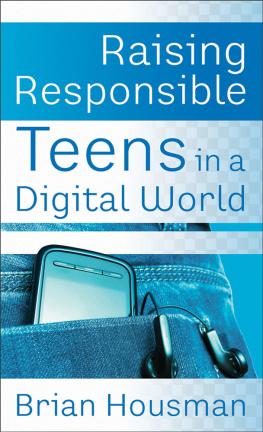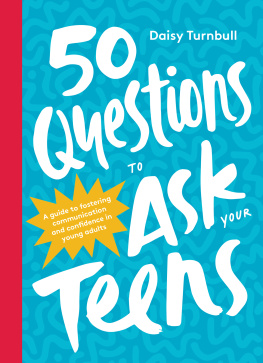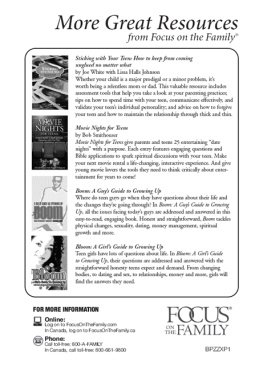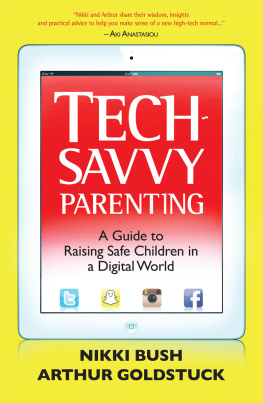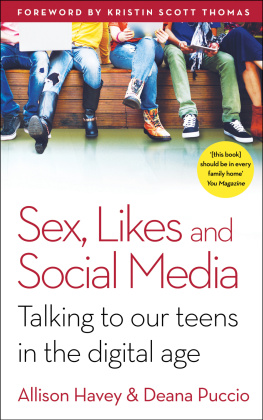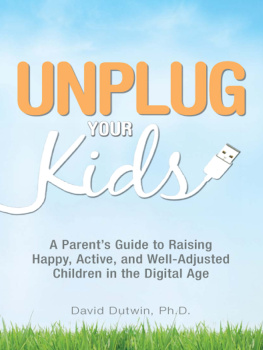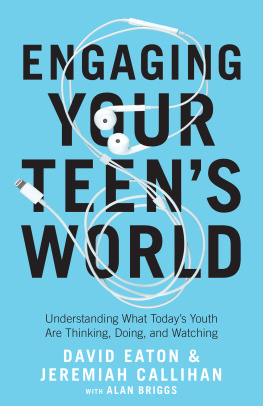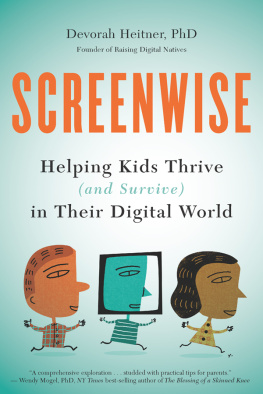Brian Housman - Raising Responsible Teens in a Digital World
Here you can read online Brian Housman - Raising Responsible Teens in a Digital World full text of the book (entire story) in english for free. Download pdf and epub, get meaning, cover and reviews about this ebook. year: 2012, publisher: Baker Publishing Group, genre: Religion. Description of the work, (preface) as well as reviews are available. Best literature library LitArk.com created for fans of good reading and offers a wide selection of genres:
Romance novel
Science fiction
Adventure
Detective
Science
History
Home and family
Prose
Art
Politics
Computer
Non-fiction
Religion
Business
Children
Humor
Choose a favorite category and find really read worthwhile books. Enjoy immersion in the world of imagination, feel the emotions of the characters or learn something new for yourself, make an fascinating discovery.
- Book:Raising Responsible Teens in a Digital World
- Author:
- Publisher:Baker Publishing Group
- Genre:
- Year:2012
- Rating:5 / 5
- Favourites:Add to favourites
- Your mark:
- 100
- 1
- 2
- 3
- 4
- 5
Raising Responsible Teens in a Digital World: summary, description and annotation
We offer to read an annotation, description, summary or preface (depends on what the author of the book "Raising Responsible Teens in a Digital World" wrote himself). If you haven't found the necessary information about the book — write in the comments, we will try to find it.
Raising Responsible Teens in a Digital World — read online for free the complete book (whole text) full work
Below is the text of the book, divided by pages. System saving the place of the last page read, allows you to conveniently read the book "Raising Responsible Teens in a Digital World" online for free, without having to search again every time where you left off. Put a bookmark, and you can go to the page where you finished reading at any time.
Font size:
Interval:
Bookmark:

2009 by Brian Housman
Published by Brazos Press
a division of Baker Publishing Group
P.O. Box 6287, Grand Rapids, MI 49516-6287
www.brazospress.com
Spire edition published 2012
Previously published under the title Engaging Your Teens World
Ebook edition created 2012
All rights reserved. No part of this publication may be reproduced, stored in a retrieval system, or transmitted in any form or by any meansfor example, electronic, photocopy, recordingwithout the prior written permission of the publisher. The only exception is brief quotations in printed reviews.
ISBN 978-1-4412-3855-9
Library of Congress Cataloging-in-Publication Data is on file at the Library of Congress, Washington, DC.
Unless otherwise noted, scripture is taken from the Holy Bible , New Living Translation, copyright 1996. Used by permission of Tyndale House Publishers, Inc., Wheaton, Illinois 60189. All rights reserved.
Scripture marked NIV is taken from the Holy Bible, New International Version. NIV. Copyright 1973, 1978, 1984, by Biblica, Inc. Used by permission of Zondervan. All rights reserved worldwide. www.zondervan.com
Occasionally, italics are used in scripture quotations for emphasis by the author.
The internet addresses, email addresses, and phone numbers in this book are accurate at the time of publication. They are provided as a resource. Baker Publishing Group does not endorse them or vouch for their content or permanence.
Your teen is now living in a postmodern culture. That fact is undeniable. The debate is no longer whether or not we inhabit a postmodern culture. A more fruitful debate is, Since we are living in a postmodern culture, how will this affect the lives of our teens as they grow older, as well as our families as we engage the culture? It affects your teens understanding of relationships, spirituality, justice, and truthall important characteristics of postmodernism. Their expression of these qualities can look markedly different from what we are used to as parents. Moreover, our unfamiliarity with this new culture can lead to uneasiness in moving into it.
But move into it we must. Author Robert Lewis said, I believe we need to accept the fact that the world has dramatically changed. We need to recognize, and not ignorantly fight against what is inevitable. If we could finally accept change, we could begin to look at, and not ignore, the issue of postmodernism.
I am not writing in defense of postmodernism or in opposition to it. I am merely attempting to shed light on the adolescent culture as it is today. My intention is not to get bogged down in a heated philosophical debate over the tenets of a postmodern worldview. As a matter of fact, after this introduction you wont see the p-word mentioned anymore. Instead, a simple understanding that the perspective of the world Im describing is from that of a postmodern teenager will be all that is necessary.
There is much of postmodernism that should give us pause. On one hand, this generation feels it is acceptable (and important) to find more meaningful ways to express truth. And this is a good thing. Nonetheless, we have a responsibility to ensure that the conclusions are indeed true, vetted with logic, reason, and scripture, and tempered with tradition.
Consider religion as an example. There are some in evangelical circles who would say that postmodernism is a humanistic and faithless philosophy. While postmodernism does place a greater emphasis on the human experience, it is filled with faith. Admittedly, that faith may look very different from what a Christian traditionalist would consider true faith. I recently watched an NBC News podcast about faith in America that had two interesting observations. One, America is the most religiously diverse nation in the world. Two, for the first time since the founding of America, Catholic Christians will soon be its largest religious group.
Postmodernism indeed has shown a change in religious expression in America, a change that continues to grow. Sociologist Tony Campolo foresees that in the coming years, the ways in which religion is expressed and the structures that institutionalize it probably will be displaced or changed. In other words, where, when, and how this generation expresses their faith in Christ will look very different from what may seem normal to us.
Religion is just one area of transformation among many. As you will see, every area of life is changing for this generation. Moreover, our unfamiliarity with the changes in this new culture can lead to parental uneasiness and unwillingness to adapt to better lead our teens.
We become like the culturally paralyzed private detective, Adrian Monk, from the TV show Monk . Although Monk looks normal, he is obsessive compulsive and suffers from multiple phobias. At times Monks phobias become so deeply incapacitating he is unable to appreciate the fresh air of a walk down the street without fears of accidental disaster at every footstep. He cant enjoy the companionship of others without feeling he will be infected with some unseen disease. Day after day he is forced to make his surroundings fit his view of normalcy, even if that means compulsively touching each parking meter as he walks by it.
This gentle and well-meaning man is genuinely concerned for the people around him but never able to fully engage them, because of his fears and rigid ideas of what makes life right. Instead of experiencing a satisfaction with his job, his family, or even himself, he isolates himself from the world around him.
In many ways, the Christian community today is filled with religious (Adrian) Monks. You love your teen and you want Gods best for them. But how they think and the things they say they believe make no sense and seem contrary to how you were raised. As you look at their world a sense of paranoia, fear, or defensiveness wells up inside you. Maybe you feel a need to protect yourself (and your teen) from the confusion and disorder in their changing world without ever stopping to understand what is bringing about the changes.
The good news is that over time, Adrian Monk has gotten a little better. Hes become tempered. Hes able to see reality more clearly. Theres a change taking place in his life, just as there is in your relationship with your teen.
Hopefully, this book will serve as a good place for you to begin to look into some of the changes your teen is likely already exploring. To make our conversation together flow a little easier, Ive broken the book into three parts.
Part 1 deals with unhealthy approaches to teen culture that many of us experience as parents. Every day we make choices as to how we will react to the world. Our responses are positions that many of our teens will adopt as they get older. If you respond with anger or disdain, chances are good that your teen will grow up with the same bent toward the world. Likewise, if you model a Christ-honoring response, they too learn how to walk wisely in their culture. But before you can do that, you may have to come face-to-face with your own responses that keep people at a distance.
Part 2 takes you on a journey of discovery into who your teenager really is. Its not important for you to understand all teenagersjust your own. Well be looking at three different parts of your kids lives:
- Their values and how they make decisions;
- Their passions and how they direct their energies;
- Their influences and how you can make a greater impact in their lives.
Once you understand healthy ways to respond to a teens culture, and you understand who your teen is, then you are ready to move into the world together to love others. This is what Part 3 is all about. If this seems like the most difficult part to you, dont worry. It is for me, too. Most of the time we engage our culture by accident or when forced tolike when our teens get into trouble or are in danger. Rarely do we think through ways to intentionally engage the world as a lifestyle of our faith.
Font size:
Interval:
Bookmark:
Similar books «Raising Responsible Teens in a Digital World»
Look at similar books to Raising Responsible Teens in a Digital World. We have selected literature similar in name and meaning in the hope of providing readers with more options to find new, interesting, not yet read works.
Discussion, reviews of the book Raising Responsible Teens in a Digital World and just readers' own opinions. Leave your comments, write what you think about the work, its meaning or the main characters. Specify what exactly you liked and what you didn't like, and why you think so.

